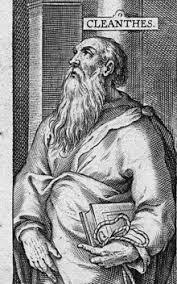
KLEANTHES of Assos is a Greek Stoic philosopher. He takes the place of Zenon ho Kitieus as the second head (<scholarch>) of the Stoic school in Athens. This position lasts for as long as 32 years. He makes a living as a boxer and, later, as a water-carrier.
Kleanthes originates new ideas in Stoic physics, and develops Stoicism in tune with materialism and pantheism. Among the fragments of Kleanthes’ writings, the largest is “Hymn to Zeus“. His pupil Chrysippos ho Soleus (Chrysippus) soon becomes one of the most important Stoic thinkers.
According to Kleanthes, pleasure is certainly “not a good”, but it is as well completely “contrary to nature” and “worthless”. He mantains that passions (love, fear, grief) are simply weaknesses. These passions lack the tension necessary to the strength of the soul, and which constitutes self-control and moral strength. He says: “people walk in wickedness all their lives or, at any rate, for the greater part of it. If they ever reach virtue, it is late and at the very sunset of their days”. Zenon said that only a passionless life (based on reason) is consistent with itself. Kleanthes completes the Stoic formula which, thus, becomes “to live consistently with nature”. The imperative is to live in full conformity with the course of the universe, because the universe is under the governance of reason.
Kleanthes consideres the Sun as being divine. It is divine because the Sun is absolutely vital for all living things. Some scholars maintain that he accused Aristarchus of impiety for daring to put into motion “the hearth of the universe” (i.e. the Earth). This thesis depends on an alteration of the studied text. In fact in the original manuscripts it is Aristarchus that accuses Kleanthes. The largest surviving fragment of Kleanthes is the portion of the Hymn to Zeus preserved in Stobaeus. In the text he assures praise and honour to Zeus, the highest privilege of all rational beings.